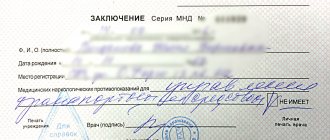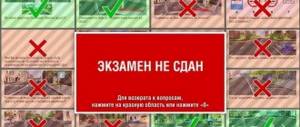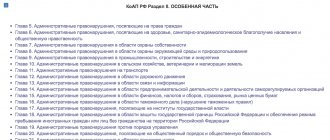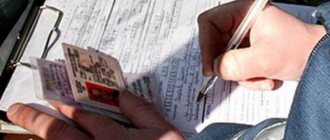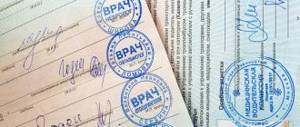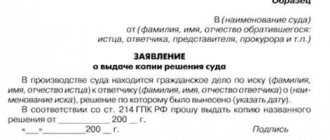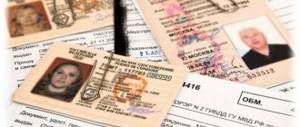Starting in 2013, a law came into force according to which the procedure for confiscation of a driver’s license is no longer carried out in case of serious violations of the rules that restrict driving. As a result, Russian courts are now issuing hundreds of orders to suspend driver's licenses every day. Hence, drivers have a lot of misunderstandings regarding the immediate process of carrying out punishment.
So, the most important are two points:
- When does the calculation of deprivation of rights begin?
- What is the time limit for obtaining a driver's license?
Let's study in detail how the procedure for withdrawing a driver's license, which is preceded by the procedure for depriving a car license, takes place today.
Procedure for revoking a driver's license
The sequence of confiscation of driving license based on a decision of the judiciary includes the following steps.
Drawing up an administrative protocol
So, a law enforcement officer recorded a gross violation of the Rules on the road, entailing confiscation of the license. After he slows down the likely culprit of the offense, he immediately displays this in the protocol. Then the stopped driver can continue his route if he is sober and in adequate condition. Otherwise, the car will be taken to the impound lot, and the violator’s relatives or friends will come for him, or he will go himself.
Sending administrative material to the court
The protocol has been drawn up. Now the inspector is obliged to submit all registered material to the magistrate’s court for consideration within three days. The location where the trial will take place may depend on the accused himself. So, if he submits a request to consider the case at his residence address and receives the consent of the judge, then the materials will be transferred to the local territorial magistrate court. Otherwise, the administrative process will take place in the area where the traffic offense took place.
It is worth noting that the case materials filed with the court include not only the protocol from the scene of the incident, but also all other evidence of the incident: report, diagram, acts, photographs, video footage.
Consideration of a case of an administrative offense
After the collected evidence and registered documents have arrived at the magistrate's court, the case is taken into consideration, the date and time of the trial are set and the accused is notified. The process, by law, must take place in the presence of a citizen, who will have to bear responsibility for the offense he has committed. But it is also possible that the trial will take place without it, if an official summons to the trial indicating all the necessary information was delivered to the driver.
At the end of the trial, the judge decides either to punish the motorist administratively or to close the case on legal grounds in accordance with the first part of Article 29.9 of the Administrative Code.
However, if the accused fails to appear in court, the hearing of the case may be postponed, and the driver may be forcibly brought in. This can happen when, under an administrative article, the culprit faces either deprivation of rights or arrest. In this situation, the offender, in the hope of avoiding arrest, simply does not come to the court hearing.
Appealing a decision on an administrative penalty
A motorist who has been administratively punished by a court by restricting his driving license has the opportunity to appeal the decision to a higher authority. According to part one of Article 30 of the Administrative Code, ten days are allotted for this after the official delivery of the written decision. If an appeal is not filed to a higher court, then the verdict rendered takes effect under Article 31 of the said code.
It is important to know that until the magistrate’s ruling has the force of law, the driver can safely continue to drive the car.
When are rights revoked?
Violating traffic rules always ends with some consequences for the violator. As a rule, a fine is used - the Code of Administrative Offenses provides for penalties in the range from 300 to 30,000 rubles. But a fine is not the only measure; drivers can be detained, removed from driving, or sent to an impound lot.
The most serious measure that can be applied to a driver is deprivation of his license. This procedure is applied only for the most serious violations that threaten other road users, as well as for malicious violations of laws. We will tell you more about the procedure for depriving a driver's license in our article.
What does it mean
Deprivation of a driver's license is a complex, multi-stage procedure that is carried out by the traffic police with the help of the court.
Its task is quite simple and understandable - to remove the driver from driving the vehicle so that he does not create any more danger for others.
In this case, the driver’s driver’s license is confiscated and transferred for storage to the traffic police, and the driver is no longer allowed to drive a car.
How is it carried out?
The procedure for depriving a driver’s license is quite complex, as it takes place in several stages and with the participation of both the traffic police and the court. It is carried out in several stages:
- A traffic police inspector or an automatic system records a violation for which the driver, according to the Administrative Code, may be deprived of the right to drive a vehicle. Moreover, in some cases (for example, when a driver’s license is revoked for driving while intoxicated), additional expertise is required;
- The protocol is sent to the traffic police, and then to the court, which will consider the violation. In this case, the driver must be notified in advance about when his case will be considered;
- During the meeting , the violation is checked to determine whether there are any circumstances that could prevent the deprivation of rights. If the court decides that the driver violated the rules without extremely compelling reasons, then a deprivation of license order is issued;
- A driver who has been deprived of his license is required to hand over his documents to the traffic police; instead, he receives a certificate stating that his papers are in storage - with their help, the document can be obtained back.
Important
Please note that the court decision can be appealed. This is given a period of 10 days, during which the driver can file an appeal and provide new evidence of his innocence.
In what cases is it deprived
Let's move directly to the violations. The list of situations in which a driver can be deprived of a driver's license is very long. Rights are taken away when the following actions are recorded:
- Exceeding the speed limit by 60 km/h or more;
- Making changes to the design and appearance of the car that are not permitted by law;
- Leaving the scene of an accident;
- Overtaking in prohibited areas;
- Intersection of double solid;
- Driving in the oncoming lane (namely driving, not overtaking);
- Driving under the “Brick” sign (except when permitted by other regulations);
- Violation of the rules for crossing railway tracks;
- Violation of traffic rules resulting in harm to health;
- Driving a car while intoxicated (alcohol or drugs);
- Refusal to undergo a medical examination in cases where the protocol requires it.
Terms of deprivation
Each violation has its own range of terms of imprisonment. Exactly how long the driver will be deprived of his license depends on the severity of the violation and the accompanying circumstances. For convenience, we will divide the offenses by terms of imprisonment:
- From 1 to 3 months – for violating the rules for using vehicle license plates, for failing to provide priority to a special services vehicle, for violating the rules for vehicle registration (if the violation is not the only one);
- From 3 to 6 months - for violating the rules for crossing railway tracks, for exceeding the speed by 60 km/h, for entering the oncoming lane and driving in the oncoming lane, for ignoring prohibiting traffic lights or traffic controller signals;
- From 6 to 12 months - for driving a car with illegally installed light signals, for driving a car in cases where the license is suspended, for repeated violations of the rules for crossing railway tracks and oncoming lanes, for speeding by 80 km/h or more;
- From 12 to 18 months – for driving a car with significant structural defects, for driving a car painted to look like special services vehicles, for leaving the scene of an accident, for drinking alcohol after an accident, for causing harm to the health of other road users;
- From 18 to 24 months - for a violation that caused moderate harm to health, for driving a car while intoxicated, for handing over a car to a drunk driver, for refusing to undergo a medical examination.
Restoration of rights
In order to restore your driver's license after deprivation, you will need to go through a very complicated procedure. To implement this you will need to complete several steps:
- Wait until the expiration date expires. It is not difficult to determine it - from the beginning of the period of deprivation (it begins 10 days after the decision on deprivation is made), the period specified in the court decision is counted;
- Collect a complete package of papers. It will include the driver’s passport, documents issued upon surrender of the license, a court decision, an application, the form of which will be issued on the spot);
- Pass the exam. You will only need to pass the theoretical part; there is no need to take the practical part. The exam takes place in a standard manner;
- Be checked for fines. The driver's license will be returned only if all traffic police fines are paid and there are no other encumbrances;
- Get your rights back.
Attention
Please note that the license will not remain with the traffic police for too long - the driver will have three years to return it. After this period, you will have to draw up a new document, which is very problematic.
Challenging deprivation
Earlier we mentioned the fact that the court will consider the case of deprivation of rights with the participation of the driver. At the same time, he can present evidence of his innocence and challenge the court's decision. If his defense is formed competently, and the evidence of correctness is significant, then a decision to deprive him of his rights will not be made.
In order to avoid deprivation, you need to enlist the support of a car lawyer and, together with him, formulate a defense strategy. You will need to decide how you will prove your innocence of the offense. At this stage, it is worth collecting the necessary case materials and other evidence.
The next step will be to actually appear in court. You can defend yourself, but it is better to invite a qualified lawyer to the hearing.
At the hearings themselves, you will need to challenge the information provided by the traffic police or supplement it with important facts.
For example, if they want to deprive you of your license for leaving the scene of an accident, you can refer to the fact that you left the scene of the accident in order to take the victims to the hospital. If successful, you will not be deprived of your rights.
Source: https://svoyurist.com/voditelskie-tonkosti/kogda-lishayut-prav
Is it necessary to surrender your license voluntarily?
In the old days, a traffic cop who stopped a driver for a violation on the road could have every right to take away his driving license. Now it is illegitimate. And according to the law, a trial is held, at the end of which a sentence is passed to confiscate the right to drive a car. Very, very many car enthusiasts still do not know about such innovations. This raises the question when depriving rights: do they need to be surrendered? after all, the alienation procedure itself no longer exists.
A detailed and clear answer to this question can be found in Article 32.7 of the Administrative Code, where it is written in black and white whether it is necessary to surrender a driver’s license if a driver’s license is revoked.
How to surrender your driver's license voluntarily?
A car owner who, while driving, became a lawbreaker, and then lost the right to drive a car in court, must understand that the entire sequence of transferring documents to the automobile inspection now occurs of his own free will, without coercion, on his own. The fact of deprivation of rights was established by a court verdict, and the driving license must be handed over actually as a formality, so that the penalty is legally fixed. Thus, having understood and accepted this accomplished act, the citizen should figure out how to surrender his license to the traffic police after deprivation.
Let's outline in detail the entire procedure, which is quite clear. The law, updated in 2013, establishes that from the moment of a court verdict, within three days, the person who committed the offense is obliged to personally deliver his driver’s document (in fact, no longer valid!) to the state traffic police, and also attach a written statement.
The same must be done if the certificate is lost, and the written statement states a request to begin counting the period of deprivation from the moment this official paper is written. If this is not done, it will turn out that formally the period of confiscation of rights will not be calculated until the document is handed over, confiscated, or until a statement of loss is received. As soon as a person brings a car license and it is officially certified, the “break in deprivation” stops, and the time of the “disenfranchised” state flows on.
For what violations can you lose your rights?
The list of violations is contained in the Code of Administrative Offenses. These include:
- driving while under the influence of drugs, alcohol, or psychotropic drugs;
- failure to comply with the procedure for transporting children at night;
- if the driver refused to undergo a medical examination;
- if the vehicle is marked with distinctive signs of emergency services, sound and light-reflecting devices are installed without the necessary permission;
- in a situation where the driver left the scene of the accident;
- when the maximum dimensions for heavy and large vehicles are exceeded;
- when transporting dangerous goods by vehicle without the necessary preparation;
- repeated arrest for driving a vehicle without state registration plates;
- if the owner of the car has transferred control to a driver who is under the influence of alcohol or drugs;
- in situations where, as a result of driving a car, light or moderate harm was caused to road users.
How to obtain a driver's license in Chelyabinsk
Where can I return my driver's license after being revoked?
The procedure for transferring deprived driver's documents is monitored and answered by the traffic police and the magistrate's court.
If the punished citizen participates in the trial directly at the place where it is being held, then at the end of the hearing the bailiffs are obliged to instruct the “disenfranchised” on the question of where to hand over the driver’s license. On the spot, you can clarify all the nuances of this unpleasant matter. But often the accused is not present at the trial. As a rule, this happens when traffic cops stopped the violating driver in the wrong area where he lives. And the trial usually takes place exactly at the place of the offense. To transfer the process to his home region, the driver must submit a written request at the time of registration of the protocol. In the event that this issue has not been resolved initially, there will be uncertainty as to where the rights should be taken after the limitation of their validity. It will be enough to simply contact the state traffic police department at the place of registration and find out everything.
How to correctly register the surrender of rights upon deprivation
So, having come to the local traffic police department, in order to say goodbye to a driver’s license for the time established by the court, the citizen draws up two copies of an application in the form of a form, where the following data is written down in detail:
- surname, name and patronymic of the chairman of the magistrate court who passed the sentence;
- number of the document reflecting the court decision;
- series and number of an identity document - passport.
It is important to ensure that the traffic police officer where you are submitting your driver’s license makes a note about the fact of delivery on the application form itself. This is necessary so that when renewing your rights after the expiration of the period of deprivation, there is confirmation that you actually transferred your rights to this specific traffic police department on a certain day of the calendar.
Department of the State Traffic Safety Inspectorate of the Ministry of Internal Affairs of Russia for the city of Chelyabinsk
Where to get it
| Name of institution | Department of the State Traffic Safety Inspectorate of the Ministry of Internal Affairs of Russia for the city of Chelyabinsk |
| Area | Leninist |
| Operating mode | Execution of administrative legislation Monday-Friday: from 08:30 to 17:45, break: from 12:00 to 13:00 Preparation of documents about road accidents daily: around the clock |
| Website | https://www.gibdd.ru |
| Phone number | +7 (duty department) (IAZ department) (accident analysis) +7 (351) 254-99-45 (accident analysis) |
| Region | Chelyabinsk region |
| Organization address | Chelyabinsk region, Chelyabinsk, Goncharenko street, 99 |
Evacuation of a vehicle to a penalty area in Chelyabinsk
What happens if you do not surrender your license when you are deprived of it?
We have enough comrades in our country who are trying in every way to avoid the sad process of passing the certificate. After all, without it it is impossible to legally drive a car, and for many this is a tragedy. Here are just a few examples of how drivers evade punishment:
- the “disenfranchised” continues to use his rights throughout the entire period of restriction of their validity, and then reports to the traffic police and demands the return of the “confiscated” document;
- the violator simply writes a written statement about the loss of the driver’s license;
- Well, some try not to run into traffic cops, reassuring themselves that the statute of limitations for the crime will pass.
It is unlikely that such tricks will work! You shouldn’t really hope that you can come with an application for the return of your ID and receive it as if nothing had happened. The fact of transfer of documents is recorded in the registration database of the state traffic inspectorate. The certificates themselves are strictly stored in the department’s archives for three years.
For the use of an invalid driver's license, severe punishment is imposed in accordance with Part 2 of Article 12.7 of the Code of Administrative Offenses. If in this case you are detained, you can expect the following:
- a fine in the amount of 30 thousand rubles;
- community service within 100-200 hours;
- fifteen days of arrest.
Let us add that it will not be particularly difficult for a traffic cop to determine the limitation of your rights, because there is a basis for this. Repeated violation of the Rules with such punishment will lead to inevitable and sad consequences.
conclusions
In conclusion of our article, let's summarize briefly and list the main points of its content. So:
- According to the law, adopted and entered into force back in 2013, the confiscation of a driver’s license is unlawful;
- Only the judicial authority is authorized to temporarily limit the validity of the VA;
- A driver who has violated traffic rules must appear at the traffic police and voluntarily hand over a document for the right to drive a car within three days after the verdict of the magistrate court is announced;
- You can arrange the transfer of a car license not only at the traffic police, but also in court. To do this, you need to write two application forms and make sure they are marked as received.
Last update: 02/27/2018
Deadlines
The court determines the punishment and period of suspension from driving. The deadline for submitting a driver's license after a court decision is determined. After the trial, you have ten days to appeal the decision if there are compelling reasons. Then you must submit the VA within three days, otherwise the calculation of the period of deprivation will be interrupted.
Due dates
Even after the trial and decision, you can still enjoy driving for a short time. Ten plus three is how many days you can drive after a court decision to deprive you of your license in 2021. Ten are given for appeal and three days after the final verdict.
If you don't submit it on time
Nothing fatal will happen. It’s just that you won’t be able to drive anyway, and the end date of your punishment will shift. You will have to wait longer for the restoration of your rights, exactly as long as the VA is passed later.
If the period of deprivation of rights has ended, but the rights are in hand, you still cannot use them, since the court decision has not been executed. In this case, they will assign the same term, plus they may imprison you for 15 days. In this regard, there is a direct interest of the violator himself to keep track of time.
